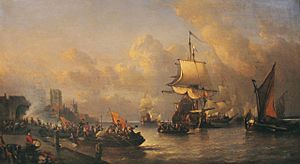Capture of Brielle facts for kids
Quick facts for kids Capture of Brielle |
|||||||
|---|---|---|---|---|---|---|---|
| Part of the Eighty Years' War | |||||||
 Depiction of the capture of Den Briel, by Anthonie Waldorp |
|||||||
|
|||||||
The Capture of Brielle was a very important event in the Eighty Years' War. This war was fought between the Netherlands (also called the Seventeen Provinces) and Spain. On April 1, 1572, a group of rebels known as the Watergeuzen took over the town of Brielle.
This event was a big turning point. Even though Brielle was not defended, taking it gave the rebels their first strong base on land. At this time, the rebellion against Spain was almost defeated. The capture of Brielle gave new hope and started a new uprising across the Netherlands. This eventually led to the creation of the Dutch Republic, which became an independent country.
How Brielle Was Captured
The Watergeuzen were led by William van der Marck, Lord of Lumey. Two of his main captains were Willem Bloys van Treslong and Lenaert Jansz de Graeff. These rebels had about 25 ships. They had just been told to leave England by Queen Elizabeth I. This meant they needed a safe place to dock their ships.
As they sailed towards Brielle, they found something surprising. The Spanish soldiers who usually guarded the town had left. They had gone to deal with problems in another city called Utrecht. So, on the evening of April 1, about 600 Watergeuzen soldiers entered the port. The town was completely undefended.
The rebels took control of the port. At first, they planned to leave after taking what they needed. But then, one of the men suggested they should stay. There was no reason for them to leave such a good spot. So, they decided to hold onto Brielle.
Remembering the Capture of Brielle
Dutch students often learn a short rhyme to help them remember this event:
- Op 1 april verloor Alva zijn bril,
This means "On April 1st, Alva lost his glasses." It's a clever pun because the Dutch word bril means 'glasses'. It sounds very similar to the town's name, Brielle or Den Briel.
The date, April 1st, is also known as April Fools' Day in the Netherlands.
The people of Brielle still celebrate this capture every year on April 1st. The celebrations include a reenactment, which is like a play, showing what happened during the capture. There is also a tradition called kalknacht, or 'chalk night'. On the night before the main festivities, young people use lime chalk. They write slogans and draw pictures on windows.
This kalknacht tradition is not always popular with everyone. In the past, some people used paint instead of chalk, which caused damage. The tradition of kalknacht started a long time ago. Locals would mark the doors of people who supported Spanish rule with chalk. This helped the Geuzen find out who might resist them when they took over the town.
In Books
The Capture of Brielle is an important part of the story in a novel by Cecelia Holland. Her book is called The Sea Beggars. However, the way the event is shown in the book is different from the actual historical facts.
See also
 In Spanish: Toma de Brielle para niños
In Spanish: Toma de Brielle para niños
 | James Van Der Zee |
 | Alma Thomas |
 | Ellis Wilson |
 | Margaret Taylor-Burroughs |

